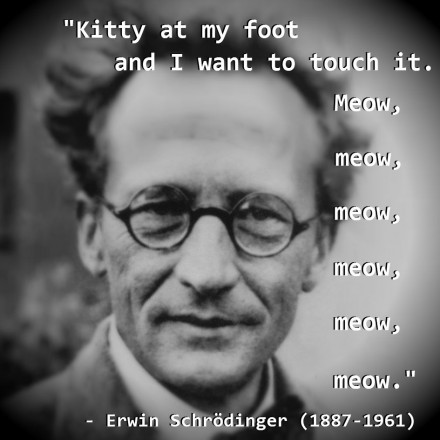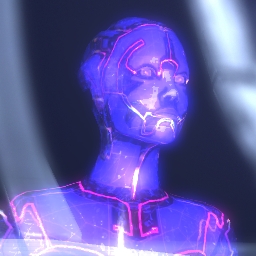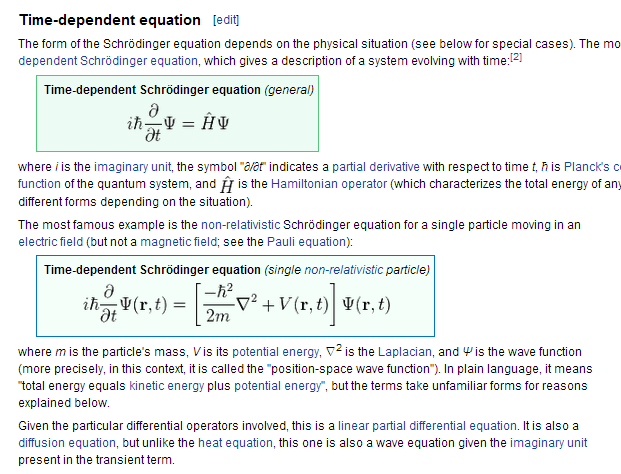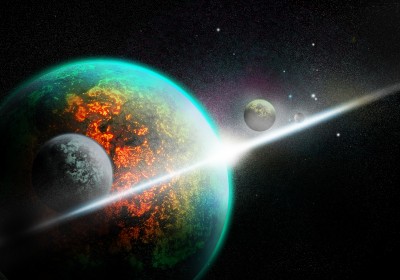It looks like you're using an Ad Blocker.
Please white-list or disable AboveTopSecret.com in your ad-blocking tool.
Thank you.
Some features of ATS will be disabled while you continue to use an ad-blocker.
8
share:

This is going to be a sequence of threads on quantum computing and the human mind. I have already outlined them, but there is a lot to cover.

As far as I know, the ideas we are working with are cutting-edge, in fact, my friend and I just designed a very basic outline of a quantum computing model today that should be able to mimic real intelligence, I will get to that on a later thread, it is a basic design, but that's cool because it should be easy to understand and I can write threads on more specifics.
The first thread that I am going to write is going to cover the gateway into understanding why quantum physics is important to consciousness, something that I have not been able to describe to anyone before in a satisfactory manner until now. Until now, the assumption is that consciousness is Newtonian and an illusion. However - fringe scientists have been working on this and been inspiring me for years.

Those are fireflies.
I was just listening to a story on N.P.R. that was discussing some behavior involving fireflies that I believe could be used in an experiment to show that the conscious mind in living beings is actually a quantum field, and the rest of the behavior of the fireflies, which resembles culture in some ways, could then be explained by neural mirroring.
Although the commentators on N.P.R. mentioned they had no idea how order could come out of disorder, I realized that was a question I had asked myself around 7 years ago and written a thesis paper on 3 to 5 years ago I had been having a spiritual crisis at the time, and spent the intervening years searching for an answer.
An explorer canoeing in some tropical river or some such adventure, found that in the wild, a certain species of firefly would blink in sync with all of the fireflies in the area. But thank God he was somewhat insane and inquisitive himself, just like me, with too much time on his hands -
He brought some fireflies back to his hotel room and released them (I think his wife fell asleep at that point) and discovered that while they blinked randomly at first, they would start to form into groups of two to three that would blink together, and then eventually the whole room was in sync.
Apparently, no one knows how order could come out of disorder according to the N.P.R. commentator, because it is against the laws of entropy.
Here is an example of the experiment, simulated.
However, life in general does not follow the laws of entropy; this experiment makes it more obvious than ever, and I am offering a scientific explanation.

I believe the fireflies are not only important to simplify what a quantum theory of mind is talking about on some level, and shows why it is necessary in the first place to help explain cognition, but could also be used as an experiment to demonstrate order coming from disorder.
In addition, I am fairly certain that quantum equations of some kind might be able to be applied to the firefly behavior. I have a friend on my team, John Lee, who is an expert with quantum physics equations and applying them to such nonsense.

In fact, there are many different insect societies that I believe could be used to study this issue further. I have no idea why insects are so easy for this, but I have a theory that it could be due to their matriarchal instead of patriarchal natures. I explain this later when talking about ants and how they interact with their queen.
Any questions are welcome, even something I'd never thought of before, I could have fun thinking about.

There are many applications of this discovery to mainstream science, the easiest being simply applying quantum equations to insect behavior in order to run some experiments, and then from that, head on into developing quantum V.I.
I think those are the safest routes and the ones that I would find easiest to work with at the moment.
------
Thank you to James Findlay, nuclear physicist and business partner for this response.
I think this is a classic example of emergent behavior. You will see the same thing in colonies of insects - order from disorder both in their behavior that seems synchronized to accomplish a given task and in the structures ultimately built for them. For instance - a flock of birds - each will fly randomly but when a certain number come together, emergent behavior appears. They will all dive at a moment, then swoop upwards within milliseconds. You see something similar with grasshoppers being brought together in ever increasing numbers.
Now synchronization of this sort - what are your expectations? I think it sounds like you are making a connection between a neuron which is physical and most would say without consciousness, but when a large number are brought together and properly organized, emergent properties such as consciousness may arise, with abilities being capable to recognize itself as being present, for example.
Are you making an analogy to the fireflies where a simple group brought together through mirroring behavior - conscious or not - also leads to emergent phenomena greater than the individual fireflies normally present qualities? How do you play with the idea of entropy? It is clearly increasing as far as this experiment through use of energy,thermal equalibria, etc. while ine one way - the ordered flashing of the fireflies - represents and shows one case of decreased entropy and increased order within the system.
My answer to him:
Yes, you are very sharp there about the connection with the nuerons to emergent behavior. If neurons are able to generate miniature quantum fields, as some research suggests, that would make them random number / idea generators. Being a true random number generator (having free will as a quantum particle) and being unpredictable to Newtonian Mechanics also exempts them from any previous causality in some very important and systematic cases - this allows for order to be created within a system.
Also, you gave an exactly correct and perfect analysis and description of what I meant about the entropy. Even though the fireflies have to eat, if you slam a Big Mac between the crack on a rock, the rock will not suddenly start producing culture.
My friend John Lee was not as convinced as James about the fact that life actually decreased entropy and increased order. As James has his speciality in nuclear physics, Lee's specialty as far as physics goes, is in quantum. I think he may have written or at least mentioned in his thesis paper using the Schrodinger Equation to predict human behavior at stop lights.

There is a simple version of the equation. I don't get it, either.
Wikipedia: Schrodinger Equation
edit on 15amFri, 15 Nov 2013 03:40:28
-0600kbamkAmerica/Chicago by darkbake because: (no reason given)
reply to post by darkbake

I had to convince John Lee with a better argument, because he didn't think that the fireflies joining together in sync represented any increase in order or decrease in entropy.
So what I explained to him in the end was, yes the fireflies were increasing entropy and using up energy overall, the difference is, John Lee went into some very specific cases involving the chemical reactions occurring that would turn food into energy, with a loss of energy during that transition.
He did admit there was a mechanism that turned this energy into the fireflies being able to perceive and band together in order to blink in order, however, in reality, there was no decrease in entropy and increase in order overall.
This is when I had to explain to him it was the mechanism I was talking about, yes, that mechanism was inefficient, just like any engine, but that mechanism allowed the fireflies to perceive each other and move towards each other and watch each other to blink together.
I explained that if you took a bunch of rocks in the desert and put them in a circle, they would tend to decay, but a bunch of fireflies together don't decay - they don't go from blinking together to wandering off aimlessly.
In fact, it is this tendency for goal-setting and direction that differentiates life from Newtonian substances like rocks or dirt. We can talk about more how this works when I bring in an experiment later involving ants.
John Lee finally agreed with me, when he discovered that I meant that a planet would naturally decay over time, however, transplant life onto that planet, and that life would grow. Now - putting life on a planet would cause the planet to decay faster in order to fuel the life.

I had to convince John Lee with a better argument, because he didn't think that the fireflies joining together in sync represented any increase in order or decrease in entropy.
So what I explained to him in the end was, yes the fireflies were increasing entropy and using up energy overall, the difference is, John Lee went into some very specific cases involving the chemical reactions occurring that would turn food into energy, with a loss of energy during that transition.
He did admit there was a mechanism that turned this energy into the fireflies being able to perceive and band together in order to blink in order, however, in reality, there was no decrease in entropy and increase in order overall.
This is when I had to explain to him it was the mechanism I was talking about, yes, that mechanism was inefficient, just like any engine, but that mechanism allowed the fireflies to perceive each other and move towards each other and watch each other to blink together.
I explained that if you took a bunch of rocks in the desert and put them in a circle, they would tend to decay, but a bunch of fireflies together don't decay - they don't go from blinking together to wandering off aimlessly.
In fact, it is this tendency for goal-setting and direction that differentiates life from Newtonian substances like rocks or dirt. We can talk about more how this works when I bring in an experiment later involving ants.
John Lee finally agreed with me, when he discovered that I meant that a planet would naturally decay over time, however, transplant life onto that planet, and that life would grow. Now - putting life on a planet would cause the planet to decay faster in order to fuel the life.
darkbake
Although the commentators on N.P.R. mentioned they had no idea how order could come out of disorder,
Apparently, no one knows how order could come out of disorder according to the N.P.R. commentator, because it is against the laws of entropy.
However, life in general does not follow the laws of entropy
order coming from disorder.
A lot of the issues regarding this can be solved with the simple understanding that people (and creationists are an excellent example) throw the words "entropy" and "order" around without having the faintest idea.
Its those "scientific" words, like "energy" that people grab and slot into situations that have absolutely no meaning, where the definition is fuzzy and malleable... then people wonder why there are problems.
Answer: Entropy has to do with thermodynamics.
It doesnt have anything to do, at all, with messy bedrooms or unwashed dishes or broken records or what the general public think of as "order".
Nothing whatsoever.
Any "order" that you wish to speak of in the same sentence has ONLY to do with thermodynamic order.
Thats all.
Anything else just results in the confusion, as seen by the NPR commentators, who have no idea what they're talking about.
It is very very easy to create thermodynamic order, as long as you dont try to do it on a universal scale. All you need to do is move heat energy from one place to another.
eg. You have a fire, and two bits of metal sitting some distance away.
1. Considering the two bits of metal, they are at thermodynamic equilibrium, they have "entropy", and no "order".
2. Now throw only one of them on the fire. It will heat up, and the temperature difference between the cold one and the hot one is thermodynamic "order", and less "entropy".
Its all very simple.
reply to post by darkbake
Really interesting themes your touching on here. I look forward to hearing more.
I have to say people make too big a deal out of entropy always increasing though. It goes up and down all the time in most open systems. Put a black thing on your lawn. After the sun goes down, it will be hotter than the grass around it, and you can watch entropy as its heat moves out of it to the grass, and it becomes the same temp. But you can watch the entropy reverse after the sun comes out and heats it again (order increases because the heat is in one place,the cool in another). The "entropy always increases" rule applies to a closed system, not an open one. So if we sealed the black thing and the grass in some container forever, the black thing would never heat up. But with the sun shining on it, it does.
Its the same thing with life. Yes, life decreases entropy its true. But seal earth in a box, cut off from the sun, and all life dies.
Anyway, off on a tangent there from your main point, but yeah, I hope to hear more thoughts on emergent/quantum consciousness.
Really interesting themes your touching on here. I look forward to hearing more.
I have to say people make too big a deal out of entropy always increasing though. It goes up and down all the time in most open systems. Put a black thing on your lawn. After the sun goes down, it will be hotter than the grass around it, and you can watch entropy as its heat moves out of it to the grass, and it becomes the same temp. But you can watch the entropy reverse after the sun comes out and heats it again (order increases because the heat is in one place,the cool in another). The "entropy always increases" rule applies to a closed system, not an open one. So if we sealed the black thing and the grass in some container forever, the black thing would never heat up. But with the sun shining on it, it does.
Its the same thing with life. Yes, life decreases entropy its true. But seal earth in a box, cut off from the sun, and all life dies.
Anyway, off on a tangent there from your main point, but yeah, I hope to hear more thoughts on emergent/quantum consciousness.
reply to post by darkbake
quantum uncertainty principle debunk
how fast each particle travels determines entropy aka. erosion or remineralization aka. conception
quantum uncertainty principle debunk
how fast each particle travels determines entropy aka. erosion or remineralization aka. conception
reply to post by darkbake
Nice thread Darkbake, i also agree that quantum computing/theory will allow us to understand the essence off consciousness to a greater degree. I strongly suspect however that quantum computing will pose even bigger questions regarding the nature of reality and our place within it.
Nice thread Darkbake, i also agree that quantum computing/theory will allow us to understand the essence off consciousness to a greater degree. I strongly suspect however that quantum computing will pose even bigger questions regarding the nature of reality and our place within it.
edit on 15-11-2013 by andy06shake because: (no reason given)
reply to post by ChefSlug
Hey, I saw your other post. Think of all that energy in the sun, all coming from the simple process of fusion. No wonder so many governments have come together on ITER. But did you know manmade fusion first happened around 1932?
www.ieeeghn.org...
Oliphant's contribution to this work was his discovery of the nuclei of helium 3 (helions) and tritium (tritons). He was also the first to discover heavy hydrogen nuclei could be made to react with each other (tritons and helions being the products, along with protons and neutrons). This fusion reaction is the basis of a hydrogen bomb and fusion power reactors.
I don't totally get it, but it looks like he built a small particle accelerator to do this. in a little lab in 1932!!!
Anyway, just an interesting factoid. But yeah, the power of the sun is the big thing.
Hey, I saw your other post. Think of all that energy in the sun, all coming from the simple process of fusion. No wonder so many governments have come together on ITER. But did you know manmade fusion first happened around 1932?
www.ieeeghn.org...
Oliphant's contribution to this work was his discovery of the nuclei of helium 3 (helions) and tritium (tritons). He was also the first to discover heavy hydrogen nuclei could be made to react with each other (tritons and helions being the products, along with protons and neutrons). This fusion reaction is the basis of a hydrogen bomb and fusion power reactors.
I don't totally get it, but it looks like he built a small particle accelerator to do this. in a little lab in 1932!!!
Anyway, just an interesting factoid. But yeah, the power of the sun is the big thing.
reply to post by alfa1
Well, that is a good point. Although as a psychology major and a math.physics major I often find that some physics relates to psychology on a more metaphorical level. I'm also not a creationist, actually, I try to (and do) keep any religion out of my arguments for these things because I think it clouds them. This kind of stuff has to be based on pure science without religious influence.
I'm still not a creationist, even so - I just notice a difference between how Newtonian matter and life behave. If that leads to spiritual stuff, the first thing I would do is focus on experiments that are purely checking out the quantum relations to creative thought processes - not even any applications - just design experiments purely to see if there is a relation.
Hmm... I might be able to use some game design software to make something and give you guys a link to test it out, although I'm not sure.
For example, although quantum computing can guess at the answer to something or a future outcome, there is often a high rate of error that would require debugging. My friend and I discussed this, and he knows of a formula that could handle it - it would involve making multiple guesses and then basically distributing them along a bell curve and getting rid of the outliers and such. Although this would have to be done by a regular CPU.
An experiment could be designed to test this out on humans using something as simple as the normal multiple-choice tests I've seen used in psychology classes before.
You know, the Russian Times even does a poll (although it is entirely biased in the way it is written) every week on the future outcome of some political thing. Polls are a good example of quantum computing, I think.
Well, that is a good point. Although as a psychology major and a math.physics major I often find that some physics relates to psychology on a more metaphorical level. I'm also not a creationist, actually, I try to (and do) keep any religion out of my arguments for these things because I think it clouds them. This kind of stuff has to be based on pure science without religious influence.
I'm still not a creationist, even so - I just notice a difference between how Newtonian matter and life behave. If that leads to spiritual stuff, the first thing I would do is focus on experiments that are purely checking out the quantum relations to creative thought processes - not even any applications - just design experiments purely to see if there is a relation.
Hmm... I might be able to use some game design software to make something and give you guys a link to test it out, although I'm not sure.
For example, although quantum computing can guess at the answer to something or a future outcome, there is often a high rate of error that would require debugging. My friend and I discussed this, and he knows of a formula that could handle it - it would involve making multiple guesses and then basically distributing them along a bell curve and getting rid of the outliers and such. Although this would have to be done by a regular CPU.
An experiment could be designed to test this out on humans using something as simple as the normal multiple-choice tests I've seen used in psychology classes before.
You know, the Russian Times even does a poll (although it is entirely biased in the way it is written) every week on the future outcome of some political thing. Polls are a good example of quantum computing, I think.
edit on 15amFri, 15 Nov 2013 04:36:21 -0600kbamkAmerica/Chicago by
darkbake because: (no reason given)
edit on 15amFri, 15 Nov 2013 04:36:50 -0600kbamkAmerica/Chicago by darkbake because: (no reason
given)
reply to post by tridentblue
That is interesting, I like it, it adds more diversity and landscape to the whole entropy argument. I'll look into this stuff more and hit up this thread again. I like criticism.
That is interesting, I like it, it adds more diversity and landscape to the whole entropy argument. I'll look into this stuff more and hit up this thread again. I like criticism.
ChefSlug
reply to post by darkbake
quantum uncertainty principle debunk
how fast each particle travels determines entropy aka. erosion or remineralization aka. conception
Going to have to check this out.
reply to post by darkbake
Now here's a thread I'm going to keep, label, and stick on a shelf. Thanks for such a good summary, and I look forward to seeing where it goes and how much more good data is placed on the thread.
Here's a recent news item from Huffington Post about using holmium atoms to enable computations:
www.huffingtonpost.com...
Now here's a thread I'm going to keep, label, and stick on a shelf. Thanks for such a good summary, and I look forward to seeing where it goes and how much more good data is placed on the thread.
Here's a recent news item from Huffington Post about using holmium atoms to enable computations:
www.huffingtonpost.com...
Quantum computers could crack codes and run more complex simulations than current machines, but actually building one is hard to do. The bits that store this complex data don't last long, because they are made of single atoms that get knocked around by stray electrons and photons in the environment.
Enter a team of physicists at Germany's Karlsruhe Institute of Technology. They found a way to get the bits to last long enough to do computations with, using the magnetic properties of a rare earth element called holmium and the symmetry of platinum. The experiment, detailed in tomorrow's (Nov. 14) issue of the journal Nature, is an important step in creating quantum computers and making quantum memory useful.
edit on 15-11-2013 by Aleister because: (no reason given)
edit on 15-11-2013 by Aleister because: (no reason given)
darkbake
reply to post by tridentblue
That is interesting, I like it, it adds more diversity and landscape to the whole entropy argument. I'll look into this stuff more and hit up this thread again. I like criticism.
I hope you don't take my words as too critical, I think you're on to incredible stuff here. You know the word "conspiracy" means "breathe together", like synchronization, like the fireflies? I think emergence is the key to understanding our minds...a conspiracy of neurons. In a similar sense, I think its valid to look at groups of people through the same lens. We form something like bigger minds often, where we each are like neurons. You can look at culture or civilazation as a sort of conspiracy, or emergence. So in a lot of ways, the biggest "conspiracies" are the ones we are all part of through or interactions. That's why I find the CT viewpoint really interesting and actually empowering.
new topics
-
Don’t Obstruct the Leftist Implosion
US Political Madness: 15 minutes ago -
NASA Black Hole Visualization - Go Beyond the Brink
Space Exploration: 52 minutes ago -
Russia police launch major manhunt after troops massacred by comrade in occupied Ukraine
Other Current Events: 3 hours ago -
Chinese scientists create new mutant Ebola strain with horror eye symptoms
Breaking Alternative News: 4 hours ago -
Maclemore - Hind's Hall (Pro-Palestine protest song)
Music: 4 hours ago -
Social Security projected to cut benefits in 2035 barring a fix
Global Meltdown: 6 hours ago -
Trump supporters training in the HILLS!!!!
US Political Madness: 7 hours ago -
Is the move to greenwashing solar and wind power set up for money laundering.
The Gray Area: 7 hours ago -
LIVE: Putin inauguration ceremony
Regional Politics: 9 hours ago -
Black kids in the Bronx don't know what the word 'computer' is
People: 10 hours ago
top topics
-
Trump supporters training in the HILLS!!!!
US Political Madness: 7 hours ago, 15 flags -
Black kids in the Bronx don't know what the word 'computer' is
People: 10 hours ago, 8 flags -
This is what it is all about
US Political Madness: 13 hours ago, 7 flags -
Chinese scientists create new mutant Ebola strain with horror eye symptoms
Breaking Alternative News: 4 hours ago, 7 flags -
Russia police launch major manhunt after troops massacred by comrade in occupied Ukraine
Other Current Events: 3 hours ago, 5 flags -
Social Security projected to cut benefits in 2035 barring a fix
Global Meltdown: 6 hours ago, 5 flags -
LIVE: Putin inauguration ceremony
Regional Politics: 9 hours ago, 3 flags -
NASA Black Hole Visualization - Go Beyond the Brink
Space Exploration: 52 minutes ago, 3 flags -
Is the move to greenwashing solar and wind power set up for money laundering.
The Gray Area: 7 hours ago, 2 flags -
Aliens and Las Vegas
Aliens and UFOs: 13 hours ago, 1 flags
active topics
-
Candidate TRUMP Now Has Crazy Judge JUAN MERCHAN After Him - The Stormy Daniels Hush-Money Case.
Political Conspiracies • 1378 • : Annee -
Breaking--Hamas Accepts New Cease Fire
Middle East Issues • 231 • : FlyersFan -
Maclemore - Hind's Hall (Pro-Palestine protest song)
Music • 5 • : FlyersFan -
Israeli strikes on southern Gaza city of Rafah kill 22, mostly children, as US advances aid package
Middle East Issues • 165 • : FlyersFan -
-@TH3WH17ERABB17- -Q- ---TIME TO SHOW THE WORLD--- -Part- --44--
Dissecting Disinformation • 856 • : Thoughtful3 -
Don’t Obstruct the Leftist Implosion
US Political Madness • 0 • : ADVISOR -
The Shed 26
General Chit Chat • 838 • : JJproductions -
We are screwed
Global Meltdown • 17 • : strongfp -
Really Unexplained
General Chit Chat • 164 • : andy06shake -
They say justice is blind.
Religion, Faith, And Theology • 3 • : andy06shake
8
